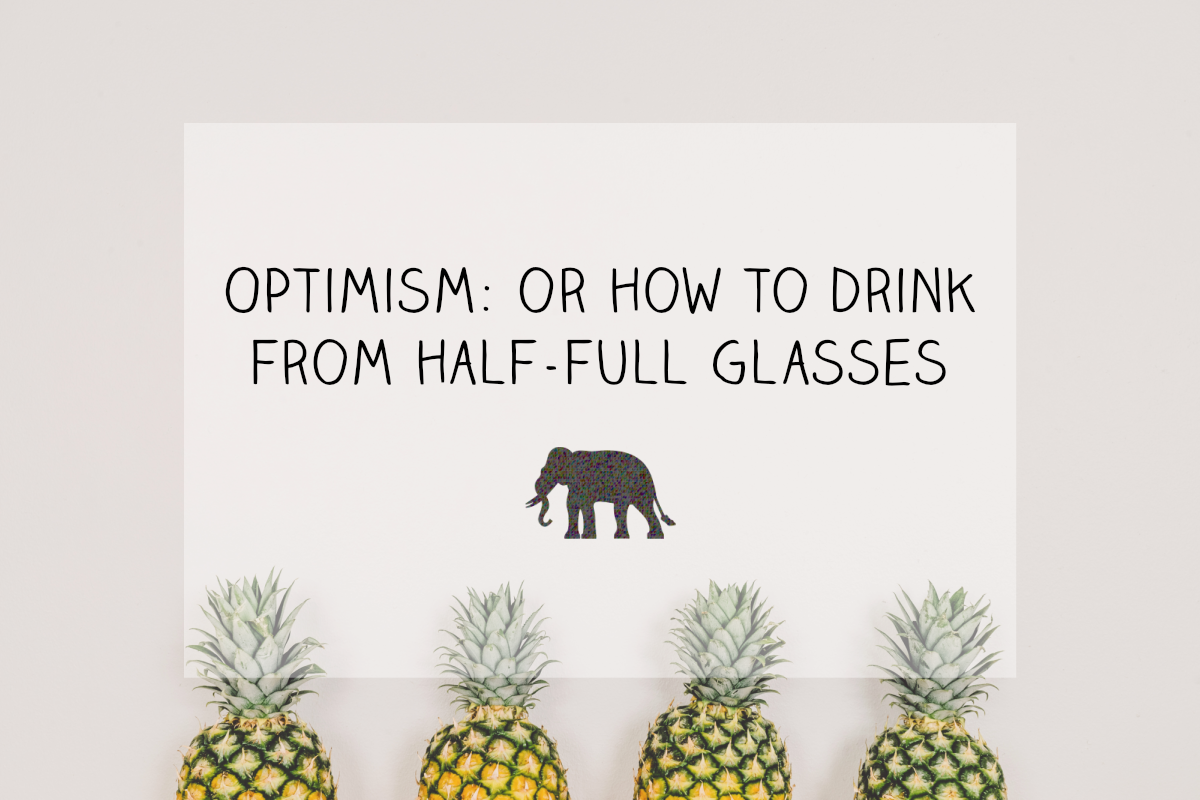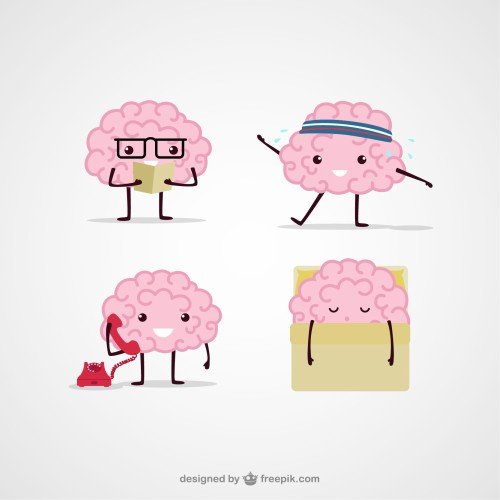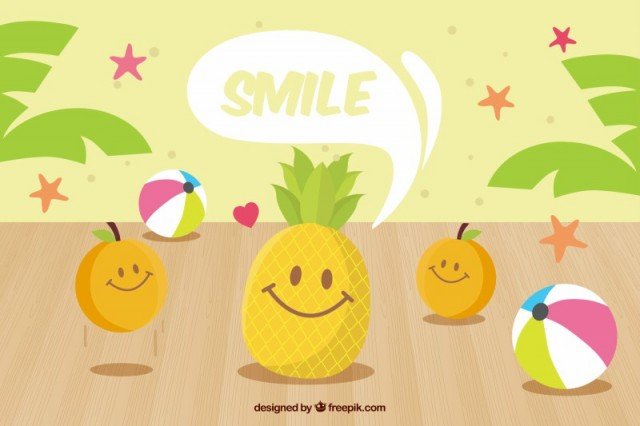OPTIMISM: OR HOW TO DRINK FROM HALF-FULL GLASSES

Last night rain poured into my open convertible. This morning, I hit my leg on the bed whilst trying to get up and when I ran to the bus stop, the bus driver laughed at me as he was speeding away. Walking to work, my heel got stuck in a manhole and I was late for that important meeting. Luckily, I packed my lunch the night before. Oh wait, I forgot to pick up my bag while I was searching for my keys. Preaching optimism to people at the bottom can be easy: Surely it can only get better if you have sunk this far. Or, it could come even worse…
It is up to us to decide how we deal with situations that life throws at us. Looked at from the distance, all our little worries are really not as bad as we make them out to be. Unless we drink from half-empty glasses, enshrine Murphy’s law and live in the constant fear of slipping on the banana peel of life. And really, who would want that?
Why do we feel like there is only bad news?
Why are we finding it so difficult to take note of the good? Because it is much easier to see current problems behind which everything else fades. To our brain, bad news is good news – it gives priority to negative signals. In ancient times, those with a stronger eye on the bad increased their chances of survival.
What was once an important instinct for survival, has evolved into a society of panic in today’s instant media world. Breaking news flashes, discussions, blogs and the twittering masses make a tsunami out of a news wave. Digital media is an excellent instrument to fuel our tendency to alarm. And media companies know very well how to use them to make us check major news updates about a sack of rice that has tumbled down in China. Exaggerated and sometimes fake news feed our legacy of evolution behind our tendency to moan and whine. I mean it can only get worse, right?
The fact is, the brain does not forget anything. It is a memory with unlimited capacity. Whatever information we receive in the course of a day will be stored up there. And we are talking about 9,000 images daily. For comparison: Our prehistoric ancestors thought in the daily struggle for survival and propagation in a maximum of 10 to 20 pictures. In the Middle Ages people made it up to 200 images or more. And today's human being sucks in information from countless sources. Wanted or unwanted. And all this information between getting up and falling asleep wanders into his consciousness and from there into the subconscious, from where it can return at any time to make our lives difficult.

Positive thinking therefore starts already by feeding our brains with the right kind of information. For the old wisdom is true: a healthy body needs a healthy mind.
One glass please, half-full.
In reality, we do believe in the good. We buy lottery tickets in the hope of winning the jackpot. We make promises to our partners to stay with them forever. The emotional centres of our brain are programmed for optimism and confidence. We remember our first kiss better than our first stomach ache. Future developments influence us much more than thinking about the past. Our brain makes the experience preferred in such a way as to give a positive outlook on what is ahead. But we need to actively control bad thoughts as they arise.
The first and most important rule of an aspiring optimist is therefore to filter the flood of incoming information. It is innate that we react to bad news with increased attention. We have to blame our aforementioned primal fear for that. It protects us but at the same time makes us suspect danger in every mildly negative message. The optimist's advice: Read news and other stories with selective ease. And don’t soak up negative information before breakfast. The images and thoughts that we are exposed to and form in the morning often decide our mood throughout the day. Hence feed your mind with positive energy in the morning. Breakfast is not just the most important meal of the day for your body but also for your mind.
The same applies for going to bed. Because at night we are even more alone with our thoughts. Going to bed happy will ensure a good night’s sleep without screaming monsters underneath our beds. Be the director who actively decides which films should be played on the inner screen.
“Wow, you look terrible!”
Another important piece of advice is to beware of scaremoangers. You know the type. The ones that tell you how terrible you look today before they have even said good morning to you. Thank you very much. Until then, everything was fine, but now you are really starting to feel like you supposedly look, terrible. Why is this?
The concept of the self-fulfilling prophecy tells us that what we expect tends to become reality. If we keep telling ourselves all the time that things will go wrong, then things will eventually go wrong. But also the opposite is true: If we expect something to turn out well, then most likely it will. Because we will do everything we can, to achieve this outcome. Our expectations influence our behaviour and other people react to it accordingly. Our own behaviour elicits the same behaviour in the people we interact with - that which reflects our expectations.
The optimist's council: Do not fall into the trap of the self-fulfilling prophecy. If you think you look terrible, you will look terrible. But since we all want to be beauty queens and hunks, this is the information we should feed our brains about ourselves.

Things rarely turn out well when we expect the worst.
"You have good news? Let me fix it for you."
Keep a healthy distance to the self- and dream-destroyers. You can recognise them by the thundercloud above their heads. They attract disaster like Kim Kardashian attracts paparazzi and are willing to share it with anyone who is not interested. Therefore, under no circumstances wake up the information urge of these miserable wretches. If you tell a dream-destroyer that you can finally buy the car for which you have been saving up for so long, they are not going to be happy about your achievement. On the contrary. They will have references to breakdown statistics and fuel consumption at hand. And they will do everything in their power to spoil your joy. The advice of the optimist: dreams are goals and if one is to set fire to them, it is yourself.
Optimism in the greater context
It is not always possible to escape the bad news walking. But we can choose to ignore to it. Over time our consciousness will let all unsightly thoughts sink lower. Then it’s best to leave them quiet. What happened has happened. Control your mind towards the future. If you can do this, you are no longer your mind’s puppet. The best protection from bad thoughts is concentration. When we get involved with a work intensively, expose ourselves to a story, our mind does not have the chance to work on other construction sites.
To open door and gate to optimism you should start with very mundane things. Drink from the half-full instead of the half-empty glass. Recognise opportunities in crises. But do not look at the world through the deceptive rose-coloured glasses. Optimism is more than naive premonition of false facts. It is state of mind that actively looks for opportunities rather than misery.
